Employability Skills Report: Analyzing Skills for Hotel Management
VerifiedAdded on 2020/10/05
|19
|6669
|438
Report
AI Summary
This report analyzes essential employability skills, focusing on self-assessment, performance objectives, problem-solving, and teamwork within the context of Travelodge Hotels. The report begins with an introduction to employability skills and their importance, followed by a detailed self-evaluation, setting responsibilities and objectives using the SMART tool. It then assesses effectiveness, identifies areas for improvement, and suggests motivational techniques. The report also explores solutions to work-based problems, communication strategies, and time management. It delves into team dynamics, problem-solving tools, and strategies for addressing labor turnover. Finally, it concludes with a summary of findings and recommendations. This report is a comprehensive exploration of key skills needed for success in the workplace, offering practical insights and strategies for professional development.
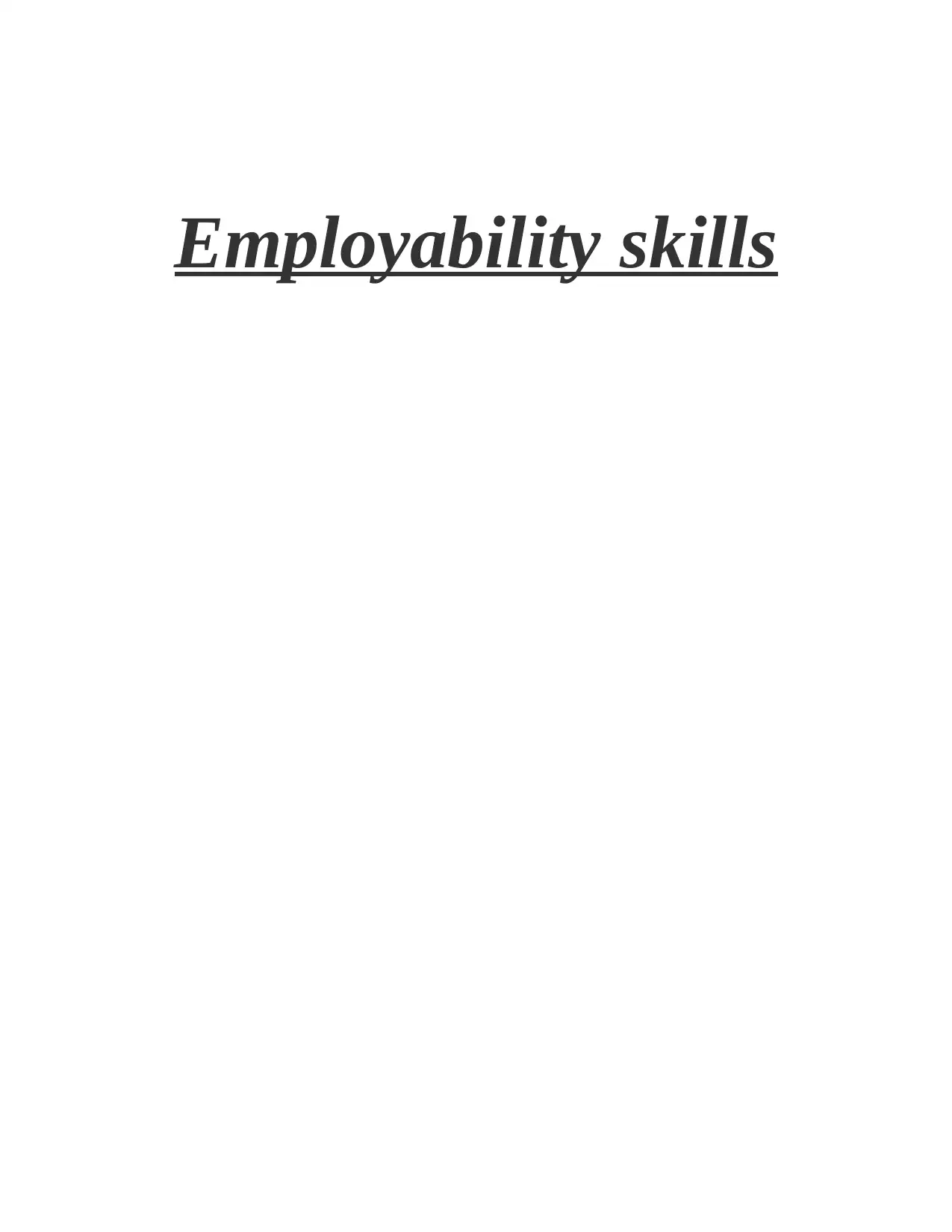
Employability skills
Paraphrase This Document
Need a fresh take? Get an instant paraphrase of this document with our AI Paraphraser
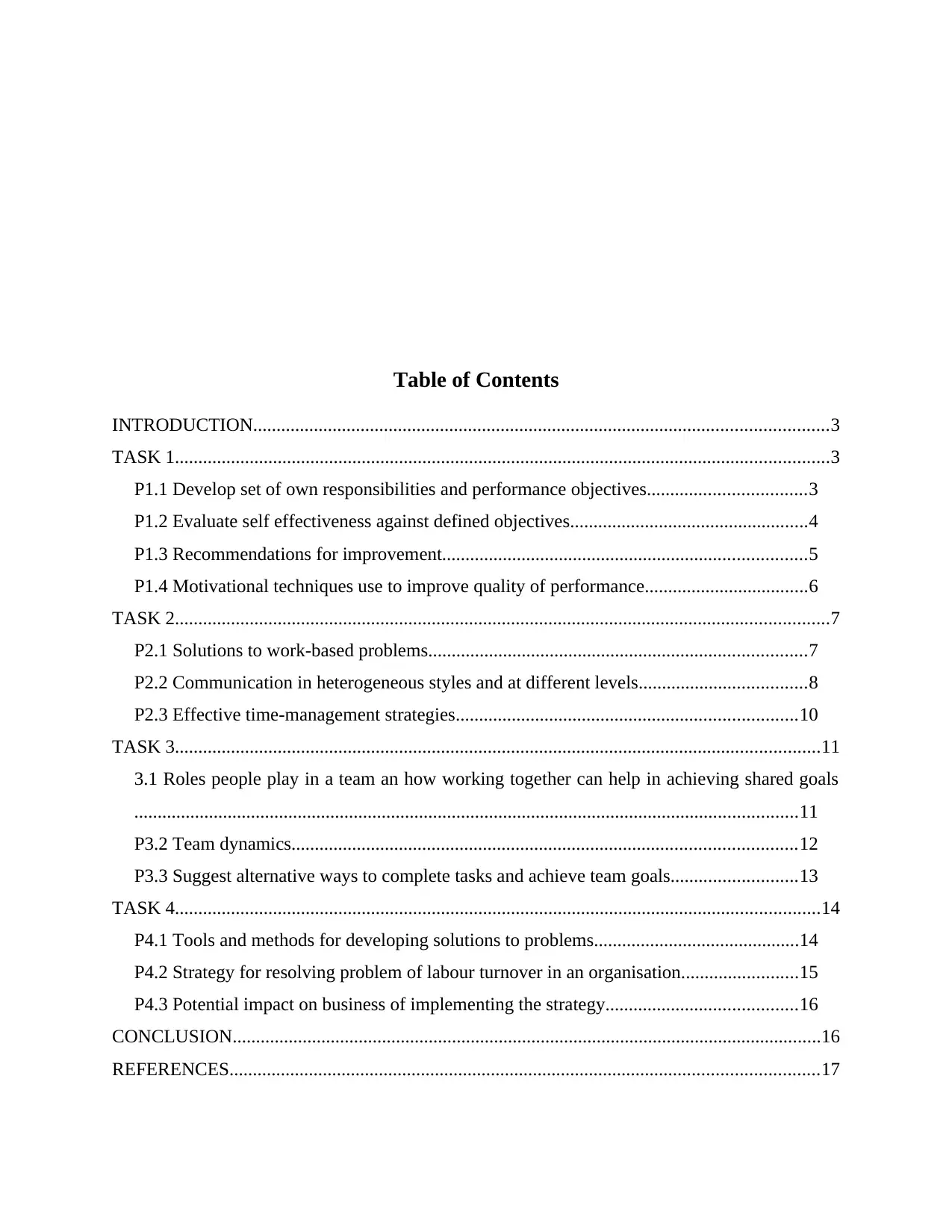
Table of Contents
INTRODUCTION...........................................................................................................................3
TASK 1............................................................................................................................................3
P1.1 Develop set of own responsibilities and performance objectives..................................3
P1.2 Evaluate self effectiveness against defined objectives...................................................4
P1.3 Recommendations for improvement..............................................................................5
P1.4 Motivational techniques use to improve quality of performance...................................6
TASK 2............................................................................................................................................7
P2.1 Solutions to work-based problems.................................................................................7
P2.2 Communication in heterogeneous styles and at different levels....................................8
P2.3 Effective time-management strategies.........................................................................10
TASK 3..........................................................................................................................................11
3.1 Roles people play in a team an how working together can help in achieving shared goals
..............................................................................................................................................11
P3.2 Team dynamics............................................................................................................12
P3.3 Suggest alternative ways to complete tasks and achieve team goals...........................13
TASK 4..........................................................................................................................................14
P4.1 Tools and methods for developing solutions to problems............................................14
P4.2 Strategy for resolving problem of labour turnover in an organisation.........................15
P4.3 Potential impact on business of implementing the strategy.........................................16
CONCLUSION..............................................................................................................................16
REFERENCES..............................................................................................................................17
INTRODUCTION...........................................................................................................................3
TASK 1............................................................................................................................................3
P1.1 Develop set of own responsibilities and performance objectives..................................3
P1.2 Evaluate self effectiveness against defined objectives...................................................4
P1.3 Recommendations for improvement..............................................................................5
P1.4 Motivational techniques use to improve quality of performance...................................6
TASK 2............................................................................................................................................7
P2.1 Solutions to work-based problems.................................................................................7
P2.2 Communication in heterogeneous styles and at different levels....................................8
P2.3 Effective time-management strategies.........................................................................10
TASK 3..........................................................................................................................................11
3.1 Roles people play in a team an how working together can help in achieving shared goals
..............................................................................................................................................11
P3.2 Team dynamics............................................................................................................12
P3.3 Suggest alternative ways to complete tasks and achieve team goals...........................13
TASK 4..........................................................................................................................................14
P4.1 Tools and methods for developing solutions to problems............................................14
P4.2 Strategy for resolving problem of labour turnover in an organisation.........................15
P4.3 Potential impact on business of implementing the strategy.........................................16
CONCLUSION..............................................................................................................................16
REFERENCES..............................................................................................................................17
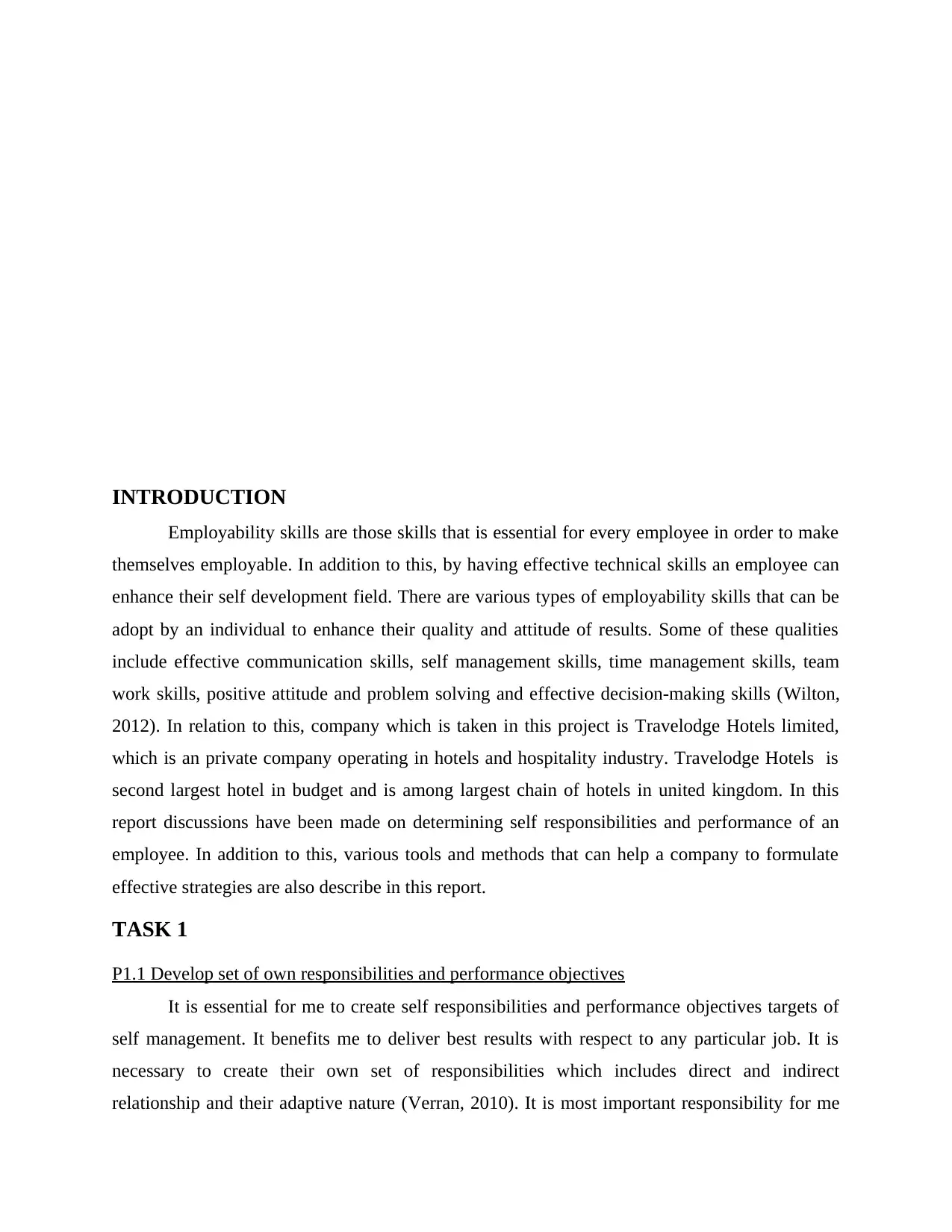
INTRODUCTION
Employability skills are those skills that is essential for every employee in order to make
themselves employable. In addition to this, by having effective technical skills an employee can
enhance their self development field. There are various types of employability skills that can be
adopt by an individual to enhance their quality and attitude of results. Some of these qualities
include effective communication skills, self management skills, time management skills, team
work skills, positive attitude and problem solving and effective decision-making skills (Wilton,
2012). In relation to this, company which is taken in this project is Travelodge Hotels limited,
which is an private company operating in hotels and hospitality industry. Travelodge Hotels is
second largest hotel in budget and is among largest chain of hotels in united kingdom. In this
report discussions have been made on determining self responsibilities and performance of an
employee. In addition to this, various tools and methods that can help a company to formulate
effective strategies are also describe in this report.
TASK 1
P1.1 Develop set of own responsibilities and performance objectives
It is essential for me to create self responsibilities and performance objectives targets of
self management. It benefits me to deliver best results with respect to any particular job. It is
necessary to create their own set of responsibilities which includes direct and indirect
relationship and their adaptive nature (Verran, 2010). It is most important responsibility for me
Employability skills are those skills that is essential for every employee in order to make
themselves employable. In addition to this, by having effective technical skills an employee can
enhance their self development field. There are various types of employability skills that can be
adopt by an individual to enhance their quality and attitude of results. Some of these qualities
include effective communication skills, self management skills, time management skills, team
work skills, positive attitude and problem solving and effective decision-making skills (Wilton,
2012). In relation to this, company which is taken in this project is Travelodge Hotels limited,
which is an private company operating in hotels and hospitality industry. Travelodge Hotels is
second largest hotel in budget and is among largest chain of hotels in united kingdom. In this
report discussions have been made on determining self responsibilities and performance of an
employee. In addition to this, various tools and methods that can help a company to formulate
effective strategies are also describe in this report.
TASK 1
P1.1 Develop set of own responsibilities and performance objectives
It is essential for me to create self responsibilities and performance objectives targets of
self management. It benefits me to deliver best results with respect to any particular job. It is
necessary to create their own set of responsibilities which includes direct and indirect
relationship and their adaptive nature (Verran, 2010). It is most important responsibility for me
⊘ This is a preview!⊘
Do you want full access?
Subscribe today to unlock all pages.

Trusted by 1+ million students worldwide
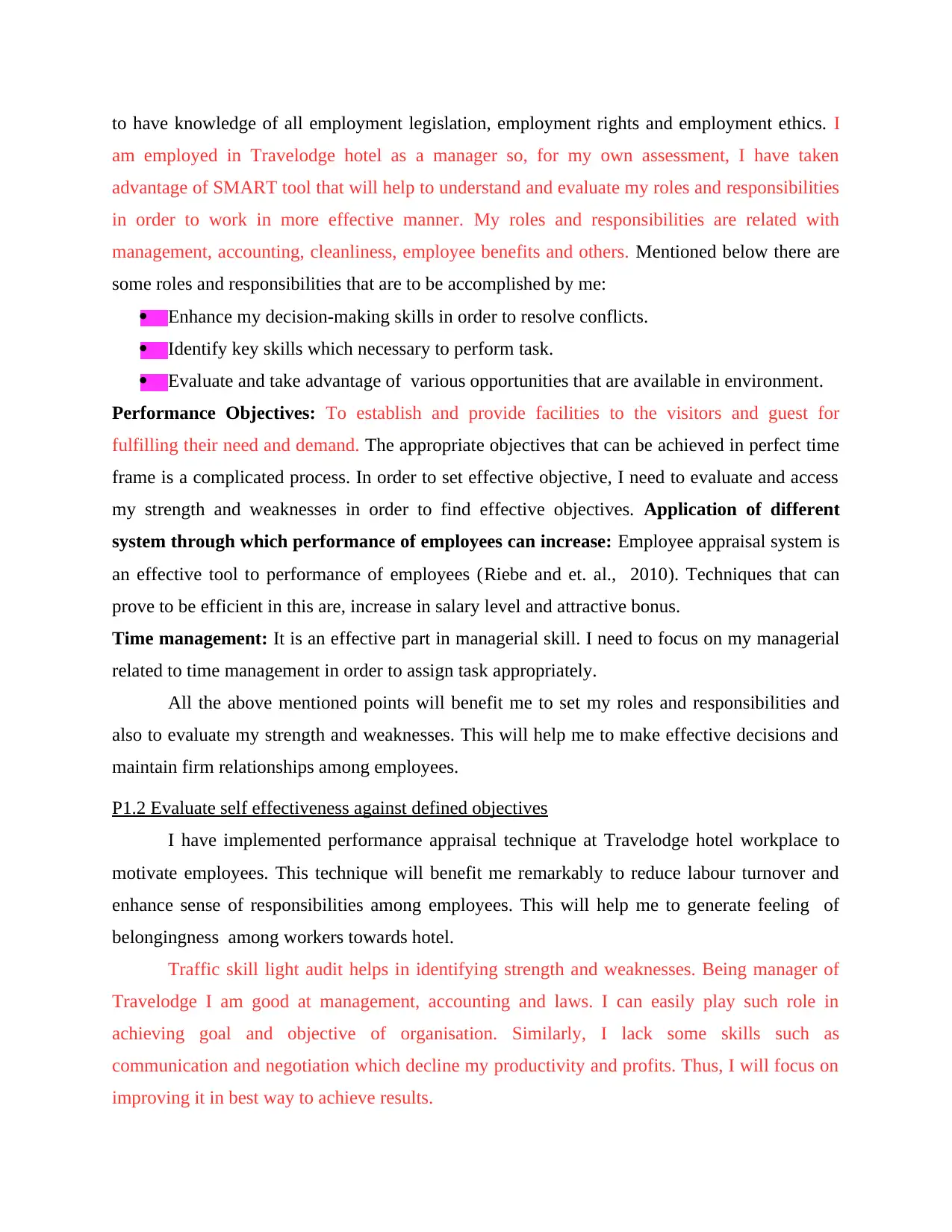
to have knowledge of all employment legislation, employment rights and employment ethics. I
am employed in Travelodge hotel as a manager so, for my own assessment, I have taken
advantage of SMART tool that will help to understand and evaluate my roles and responsibilities
in order to work in more effective manner. My roles and responsibilities are related with
management, accounting, cleanliness, employee benefits and others. Mentioned below there are
some roles and responsibilities that are to be accomplished by me:
Enhance my decision-making skills in order to resolve conflicts.
Identify key skills which necessary to perform task.
Evaluate and take advantage of various opportunities that are available in environment.
Performance Objectives: To establish and provide facilities to the visitors and guest for
fulfilling their need and demand. The appropriate objectives that can be achieved in perfect time
frame is a complicated process. In order to set effective objective, I need to evaluate and access
my strength and weaknesses in order to find effective objectives. Application of different
system through which performance of employees can increase: Employee appraisal system is
an effective tool to performance of employees (Riebe and et. al., 2010). Techniques that can
prove to be efficient in this are, increase in salary level and attractive bonus.
Time management: It is an effective part in managerial skill. I need to focus on my managerial
related to time management in order to assign task appropriately.
All the above mentioned points will benefit me to set my roles and responsibilities and
also to evaluate my strength and weaknesses. This will help me to make effective decisions and
maintain firm relationships among employees.
P1.2 Evaluate self effectiveness against defined objectives
I have implemented performance appraisal technique at Travelodge hotel workplace to
motivate employees. This technique will benefit me remarkably to reduce labour turnover and
enhance sense of responsibilities among employees. This will help me to generate feeling of
belongingness among workers towards hotel.
Traffic skill light audit helps in identifying strength and weaknesses. Being manager of
Travelodge I am good at management, accounting and laws. I can easily play such role in
achieving goal and objective of organisation. Similarly, I lack some skills such as
communication and negotiation which decline my productivity and profits. Thus, I will focus on
improving it in best way to achieve results.
am employed in Travelodge hotel as a manager so, for my own assessment, I have taken
advantage of SMART tool that will help to understand and evaluate my roles and responsibilities
in order to work in more effective manner. My roles and responsibilities are related with
management, accounting, cleanliness, employee benefits and others. Mentioned below there are
some roles and responsibilities that are to be accomplished by me:
Enhance my decision-making skills in order to resolve conflicts.
Identify key skills which necessary to perform task.
Evaluate and take advantage of various opportunities that are available in environment.
Performance Objectives: To establish and provide facilities to the visitors and guest for
fulfilling their need and demand. The appropriate objectives that can be achieved in perfect time
frame is a complicated process. In order to set effective objective, I need to evaluate and access
my strength and weaknesses in order to find effective objectives. Application of different
system through which performance of employees can increase: Employee appraisal system is
an effective tool to performance of employees (Riebe and et. al., 2010). Techniques that can
prove to be efficient in this are, increase in salary level and attractive bonus.
Time management: It is an effective part in managerial skill. I need to focus on my managerial
related to time management in order to assign task appropriately.
All the above mentioned points will benefit me to set my roles and responsibilities and
also to evaluate my strength and weaknesses. This will help me to make effective decisions and
maintain firm relationships among employees.
P1.2 Evaluate self effectiveness against defined objectives
I have implemented performance appraisal technique at Travelodge hotel workplace to
motivate employees. This technique will benefit me remarkably to reduce labour turnover and
enhance sense of responsibilities among employees. This will help me to generate feeling of
belongingness among workers towards hotel.
Traffic skill light audit helps in identifying strength and weaknesses. Being manager of
Travelodge I am good at management, accounting and laws. I can easily play such role in
achieving goal and objective of organisation. Similarly, I lack some skills such as
communication and negotiation which decline my productivity and profits. Thus, I will focus on
improving it in best way to achieve results.
Paraphrase This Document
Need a fresh take? Get an instant paraphrase of this document with our AI Paraphraser
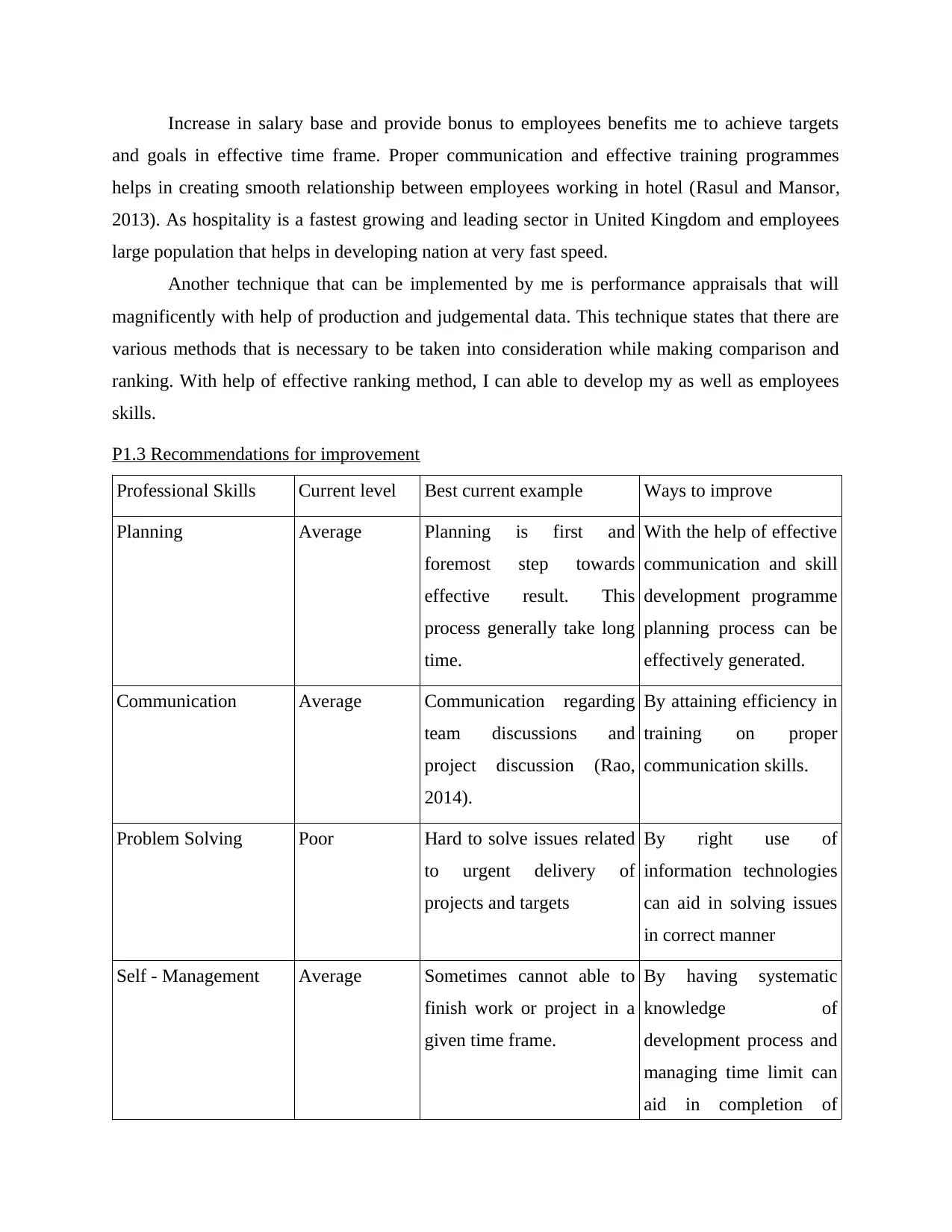
Increase in salary base and provide bonus to employees benefits me to achieve targets
and goals in effective time frame. Proper communication and effective training programmes
helps in creating smooth relationship between employees working in hotel (Rasul and Mansor,
2013). As hospitality is a fastest growing and leading sector in United Kingdom and employees
large population that helps in developing nation at very fast speed.
Another technique that can be implemented by me is performance appraisals that will
magnificently with help of production and judgemental data. This technique states that there are
various methods that is necessary to be taken into consideration while making comparison and
ranking. With help of effective ranking method, I can able to develop my as well as employees
skills.
P1.3 Recommendations for improvement
Professional Skills Current level Best current example Ways to improve
Planning Average Planning is first and
foremost step towards
effective result. This
process generally take long
time.
With the help of effective
communication and skill
development programme
planning process can be
effectively generated.
Communication Average Communication regarding
team discussions and
project discussion (Rao,
2014).
By attaining efficiency in
training on proper
communication skills.
Problem Solving Poor Hard to solve issues related
to urgent delivery of
projects and targets
By right use of
information technologies
can aid in solving issues
in correct manner
Self - Management Average Sometimes cannot able to
finish work or project in a
given time frame.
By having systematic
knowledge of
development process and
managing time limit can
aid in completion of
and goals in effective time frame. Proper communication and effective training programmes
helps in creating smooth relationship between employees working in hotel (Rasul and Mansor,
2013). As hospitality is a fastest growing and leading sector in United Kingdom and employees
large population that helps in developing nation at very fast speed.
Another technique that can be implemented by me is performance appraisals that will
magnificently with help of production and judgemental data. This technique states that there are
various methods that is necessary to be taken into consideration while making comparison and
ranking. With help of effective ranking method, I can able to develop my as well as employees
skills.
P1.3 Recommendations for improvement
Professional Skills Current level Best current example Ways to improve
Planning Average Planning is first and
foremost step towards
effective result. This
process generally take long
time.
With the help of effective
communication and skill
development programme
planning process can be
effectively generated.
Communication Average Communication regarding
team discussions and
project discussion (Rao,
2014).
By attaining efficiency in
training on proper
communication skills.
Problem Solving Poor Hard to solve issues related
to urgent delivery of
projects and targets
By right use of
information technologies
can aid in solving issues
in correct manner
Self - Management Average Sometimes cannot able to
finish work or project in a
given time frame.
By having systematic
knowledge of
development process and
managing time limit can
aid in completion of
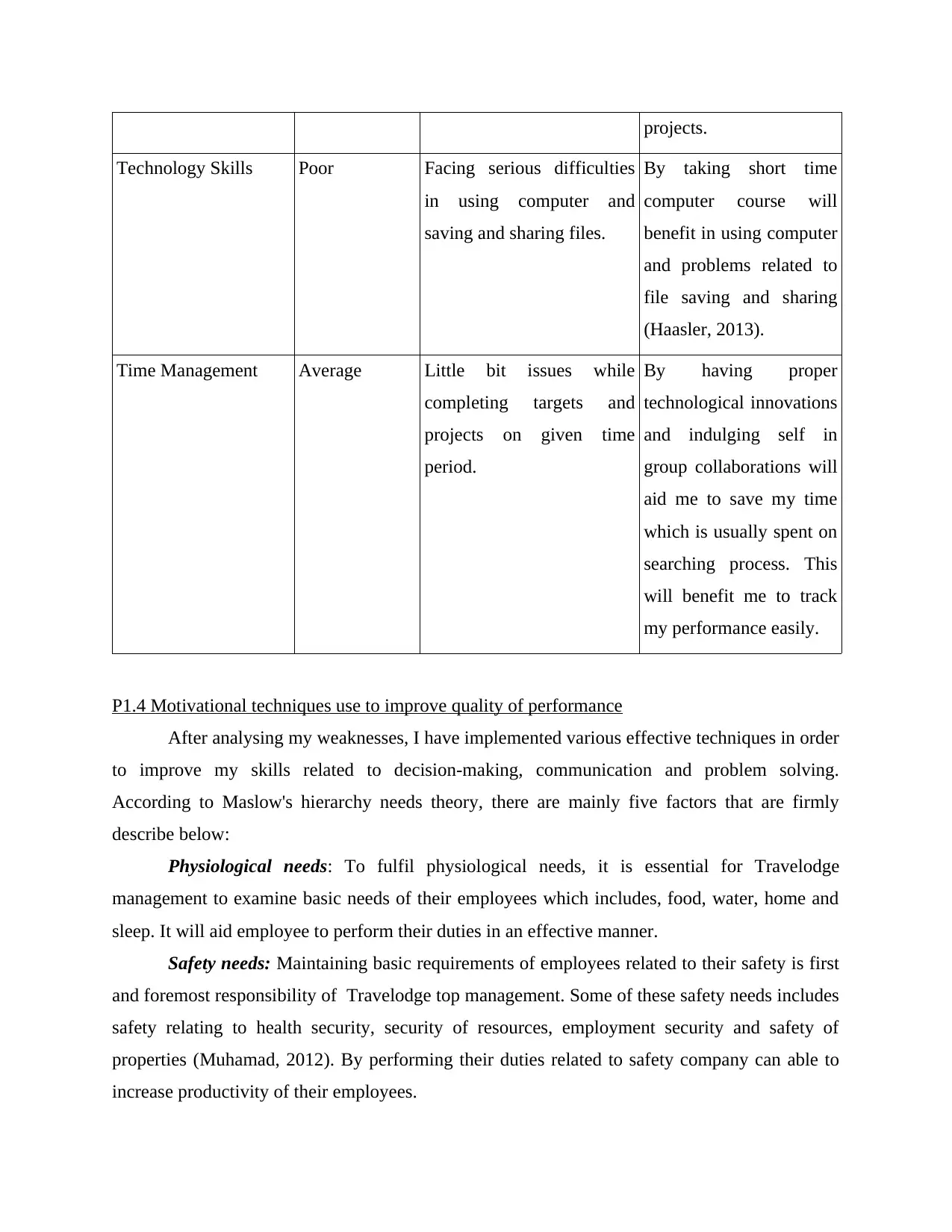
projects.
Technology Skills Poor Facing serious difficulties
in using computer and
saving and sharing files.
By taking short time
computer course will
benefit in using computer
and problems related to
file saving and sharing
(Haasler, 2013).
Time Management Average Little bit issues while
completing targets and
projects on given time
period.
By having proper
technological innovations
and indulging self in
group collaborations will
aid me to save my time
which is usually spent on
searching process. This
will benefit me to track
my performance easily.
P1.4 Motivational techniques use to improve quality of performance
After analysing my weaknesses, I have implemented various effective techniques in order
to improve my skills related to decision-making, communication and problem solving.
According to Maslow's hierarchy needs theory, there are mainly five factors that are firmly
describe below:
Physiological needs: To fulfil physiological needs, it is essential for Travelodge
management to examine basic needs of their employees which includes, food, water, home and
sleep. It will aid employee to perform their duties in an effective manner.
Safety needs: Maintaining basic requirements of employees related to their safety is first
and foremost responsibility of Travelodge top management. Some of these safety needs includes
safety relating to health security, security of resources, employment security and safety of
properties (Muhamad, 2012). By performing their duties related to safety company can able to
increase productivity of their employees.
Technology Skills Poor Facing serious difficulties
in using computer and
saving and sharing files.
By taking short time
computer course will
benefit in using computer
and problems related to
file saving and sharing
(Haasler, 2013).
Time Management Average Little bit issues while
completing targets and
projects on given time
period.
By having proper
technological innovations
and indulging self in
group collaborations will
aid me to save my time
which is usually spent on
searching process. This
will benefit me to track
my performance easily.
P1.4 Motivational techniques use to improve quality of performance
After analysing my weaknesses, I have implemented various effective techniques in order
to improve my skills related to decision-making, communication and problem solving.
According to Maslow's hierarchy needs theory, there are mainly five factors that are firmly
describe below:
Physiological needs: To fulfil physiological needs, it is essential for Travelodge
management to examine basic needs of their employees which includes, food, water, home and
sleep. It will aid employee to perform their duties in an effective manner.
Safety needs: Maintaining basic requirements of employees related to their safety is first
and foremost responsibility of Travelodge top management. Some of these safety needs includes
safety relating to health security, security of resources, employment security and safety of
properties (Muhamad, 2012). By performing their duties related to safety company can able to
increase productivity of their employees.
⊘ This is a preview!⊘
Do you want full access?
Subscribe today to unlock all pages.

Trusted by 1+ million students worldwide
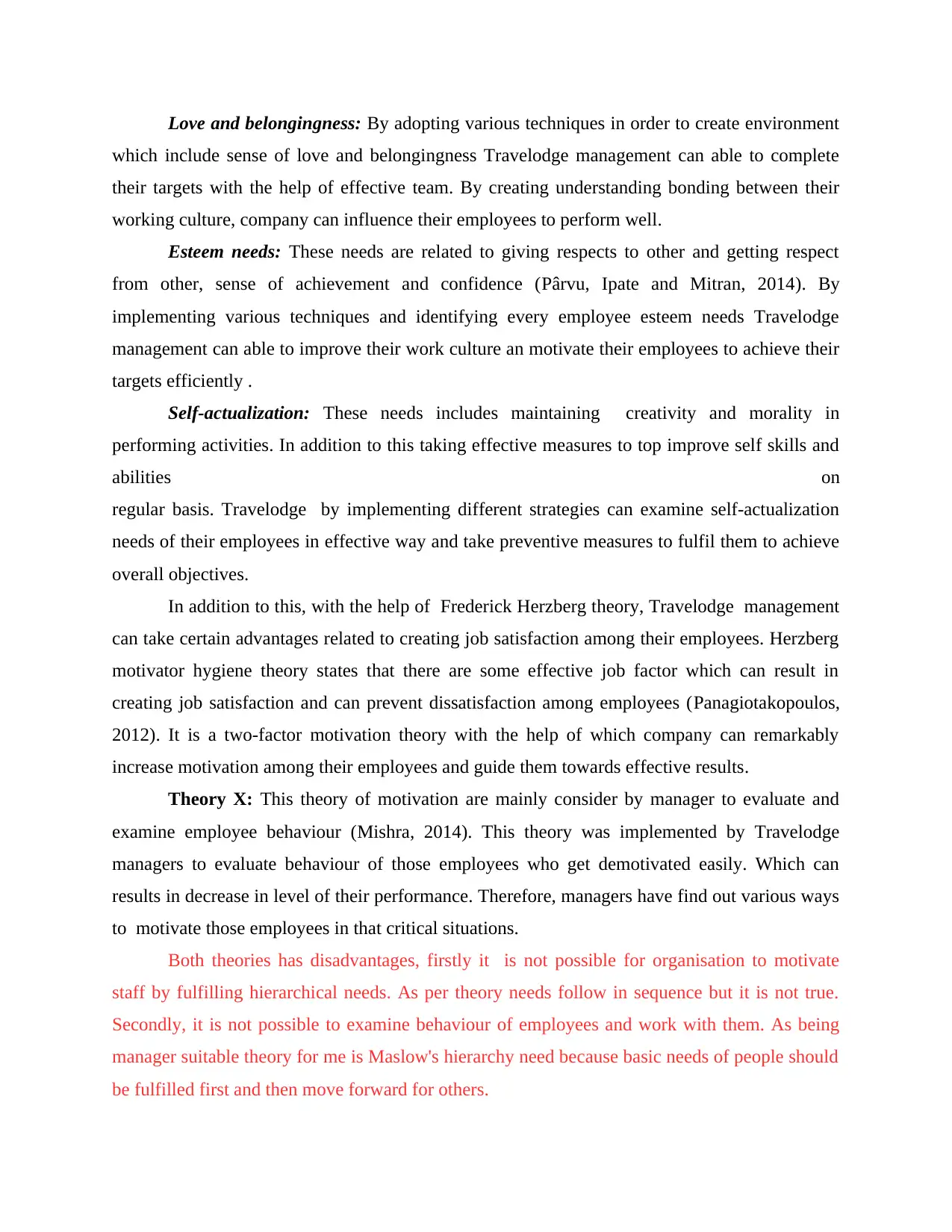
Love and belongingness: By adopting various techniques in order to create environment
which include sense of love and belongingness Travelodge management can able to complete
their targets with the help of effective team. By creating understanding bonding between their
working culture, company can influence their employees to perform well.
Esteem needs: These needs are related to giving respects to other and getting respect
from other, sense of achievement and confidence (Pârvu, Ipate and Mitran, 2014). By
implementing various techniques and identifying every employee esteem needs Travelodge
management can able to improve their work culture an motivate their employees to achieve their
targets efficiently .
Self-actualization: These needs includes maintaining creativity and morality in
performing activities. In addition to this taking effective measures to top improve self skills and
abilities on
regular basis. Travelodge by implementing different strategies can examine self-actualization
needs of their employees in effective way and take preventive measures to fulfil them to achieve
overall objectives.
In addition to this, with the help of Frederick Herzberg theory, Travelodge management
can take certain advantages related to creating job satisfaction among their employees. Herzberg
motivator hygiene theory states that there are some effective job factor which can result in
creating job satisfaction and can prevent dissatisfaction among employees (Panagiotakopoulos,
2012). It is a two-factor motivation theory with the help of which company can remarkably
increase motivation among their employees and guide them towards effective results.
Theory X: This theory of motivation are mainly consider by manager to evaluate and
examine employee behaviour (Mishra, 2014). This theory was implemented by Travelodge
managers to evaluate behaviour of those employees who get demotivated easily. Which can
results in decrease in level of their performance. Therefore, managers have find out various ways
to motivate those employees in that critical situations.
Both theories has disadvantages, firstly it is not possible for organisation to motivate
staff by fulfilling hierarchical needs. As per theory needs follow in sequence but it is not true.
Secondly, it is not possible to examine behaviour of employees and work with them. As being
manager suitable theory for me is Maslow's hierarchy need because basic needs of people should
be fulfilled first and then move forward for others.
which include sense of love and belongingness Travelodge management can able to complete
their targets with the help of effective team. By creating understanding bonding between their
working culture, company can influence their employees to perform well.
Esteem needs: These needs are related to giving respects to other and getting respect
from other, sense of achievement and confidence (Pârvu, Ipate and Mitran, 2014). By
implementing various techniques and identifying every employee esteem needs Travelodge
management can able to improve their work culture an motivate their employees to achieve their
targets efficiently .
Self-actualization: These needs includes maintaining creativity and morality in
performing activities. In addition to this taking effective measures to top improve self skills and
abilities on
regular basis. Travelodge by implementing different strategies can examine self-actualization
needs of their employees in effective way and take preventive measures to fulfil them to achieve
overall objectives.
In addition to this, with the help of Frederick Herzberg theory, Travelodge management
can take certain advantages related to creating job satisfaction among their employees. Herzberg
motivator hygiene theory states that there are some effective job factor which can result in
creating job satisfaction and can prevent dissatisfaction among employees (Panagiotakopoulos,
2012). It is a two-factor motivation theory with the help of which company can remarkably
increase motivation among their employees and guide them towards effective results.
Theory X: This theory of motivation are mainly consider by manager to evaluate and
examine employee behaviour (Mishra, 2014). This theory was implemented by Travelodge
managers to evaluate behaviour of those employees who get demotivated easily. Which can
results in decrease in level of their performance. Therefore, managers have find out various ways
to motivate those employees in that critical situations.
Both theories has disadvantages, firstly it is not possible for organisation to motivate
staff by fulfilling hierarchical needs. As per theory needs follow in sequence but it is not true.
Secondly, it is not possible to examine behaviour of employees and work with them. As being
manager suitable theory for me is Maslow's hierarchy need because basic needs of people should
be fulfilled first and then move forward for others.
Paraphrase This Document
Need a fresh take? Get an instant paraphrase of this document with our AI Paraphraser
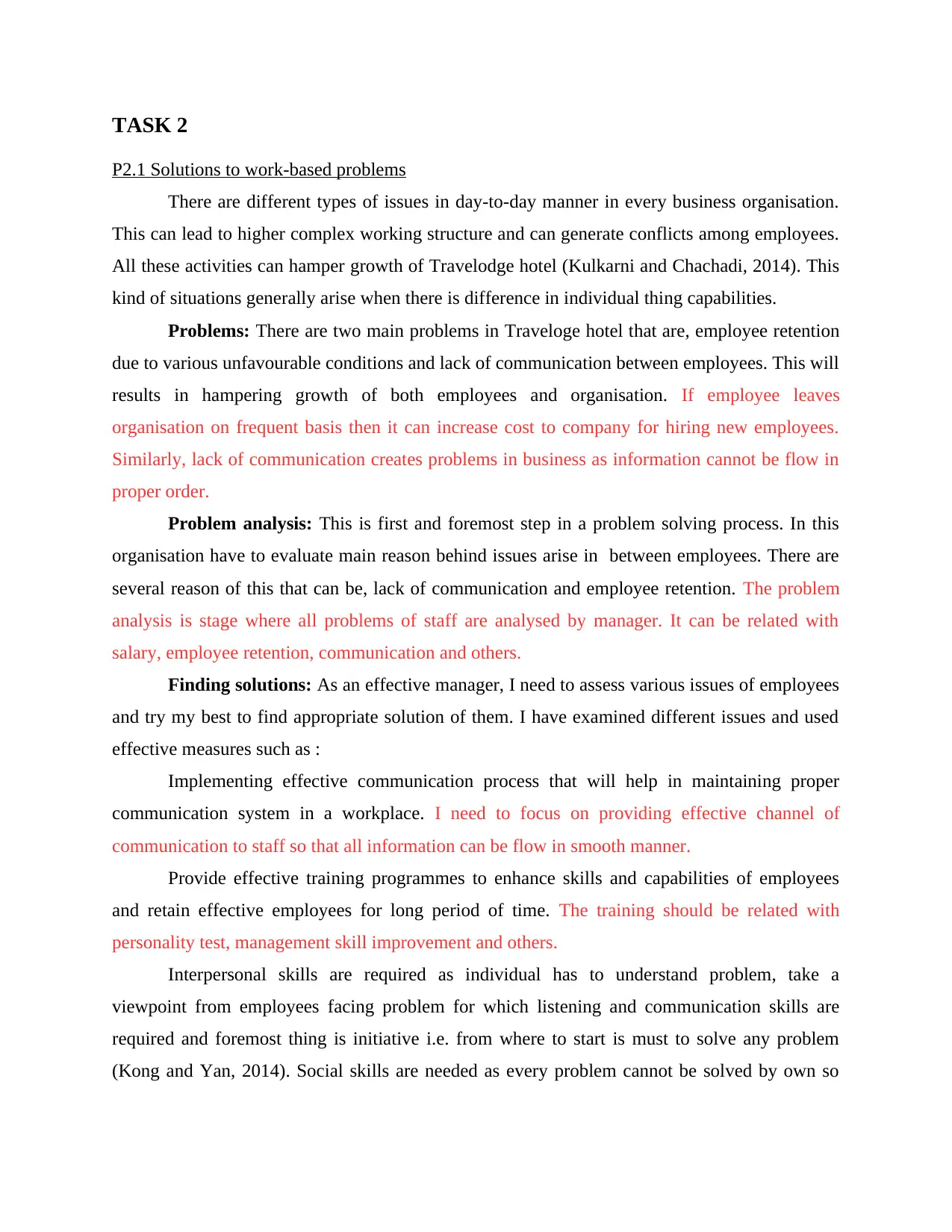
TASK 2
P2.1 Solutions to work-based problems
There are different types of issues in day-to-day manner in every business organisation.
This can lead to higher complex working structure and can generate conflicts among employees.
All these activities can hamper growth of Travelodge hotel (Kulkarni and Chachadi, 2014). This
kind of situations generally arise when there is difference in individual thing capabilities.
Problems: There are two main problems in Traveloge hotel that are, employee retention
due to various unfavourable conditions and lack of communication between employees. This will
results in hampering growth of both employees and organisation. If employee leaves
organisation on frequent basis then it can increase cost to company for hiring new employees.
Similarly, lack of communication creates problems in business as information cannot be flow in
proper order.
Problem analysis: This is first and foremost step in a problem solving process. In this
organisation have to evaluate main reason behind issues arise in between employees. There are
several reason of this that can be, lack of communication and employee retention. The problem
analysis is stage where all problems of staff are analysed by manager. It can be related with
salary, employee retention, communication and others.
Finding solutions: As an effective manager, I need to assess various issues of employees
and try my best to find appropriate solution of them. I have examined different issues and used
effective measures such as :
Implementing effective communication process that will help in maintaining proper
communication system in a workplace. I need to focus on providing effective channel of
communication to staff so that all information can be flow in smooth manner.
Provide effective training programmes to enhance skills and capabilities of employees
and retain effective employees for long period of time. The training should be related with
personality test, management skill improvement and others.
Interpersonal skills are required as individual has to understand problem, take a
viewpoint from employees facing problem for which listening and communication skills are
required and foremost thing is initiative i.e. from where to start is must to solve any problem
(Kong and Yan, 2014). Social skills are needed as every problem cannot be solved by own so
P2.1 Solutions to work-based problems
There are different types of issues in day-to-day manner in every business organisation.
This can lead to higher complex working structure and can generate conflicts among employees.
All these activities can hamper growth of Travelodge hotel (Kulkarni and Chachadi, 2014). This
kind of situations generally arise when there is difference in individual thing capabilities.
Problems: There are two main problems in Traveloge hotel that are, employee retention
due to various unfavourable conditions and lack of communication between employees. This will
results in hampering growth of both employees and organisation. If employee leaves
organisation on frequent basis then it can increase cost to company for hiring new employees.
Similarly, lack of communication creates problems in business as information cannot be flow in
proper order.
Problem analysis: This is first and foremost step in a problem solving process. In this
organisation have to evaluate main reason behind issues arise in between employees. There are
several reason of this that can be, lack of communication and employee retention. The problem
analysis is stage where all problems of staff are analysed by manager. It can be related with
salary, employee retention, communication and others.
Finding solutions: As an effective manager, I need to assess various issues of employees
and try my best to find appropriate solution of them. I have examined different issues and used
effective measures such as :
Implementing effective communication process that will help in maintaining proper
communication system in a workplace. I need to focus on providing effective channel of
communication to staff so that all information can be flow in smooth manner.
Provide effective training programmes to enhance skills and capabilities of employees
and retain effective employees for long period of time. The training should be related with
personality test, management skill improvement and others.
Interpersonal skills are required as individual has to understand problem, take a
viewpoint from employees facing problem for which listening and communication skills are
required and foremost thing is initiative i.e. from where to start is must to solve any problem
(Kong and Yan, 2014). Social skills are needed as every problem cannot be solved by own so
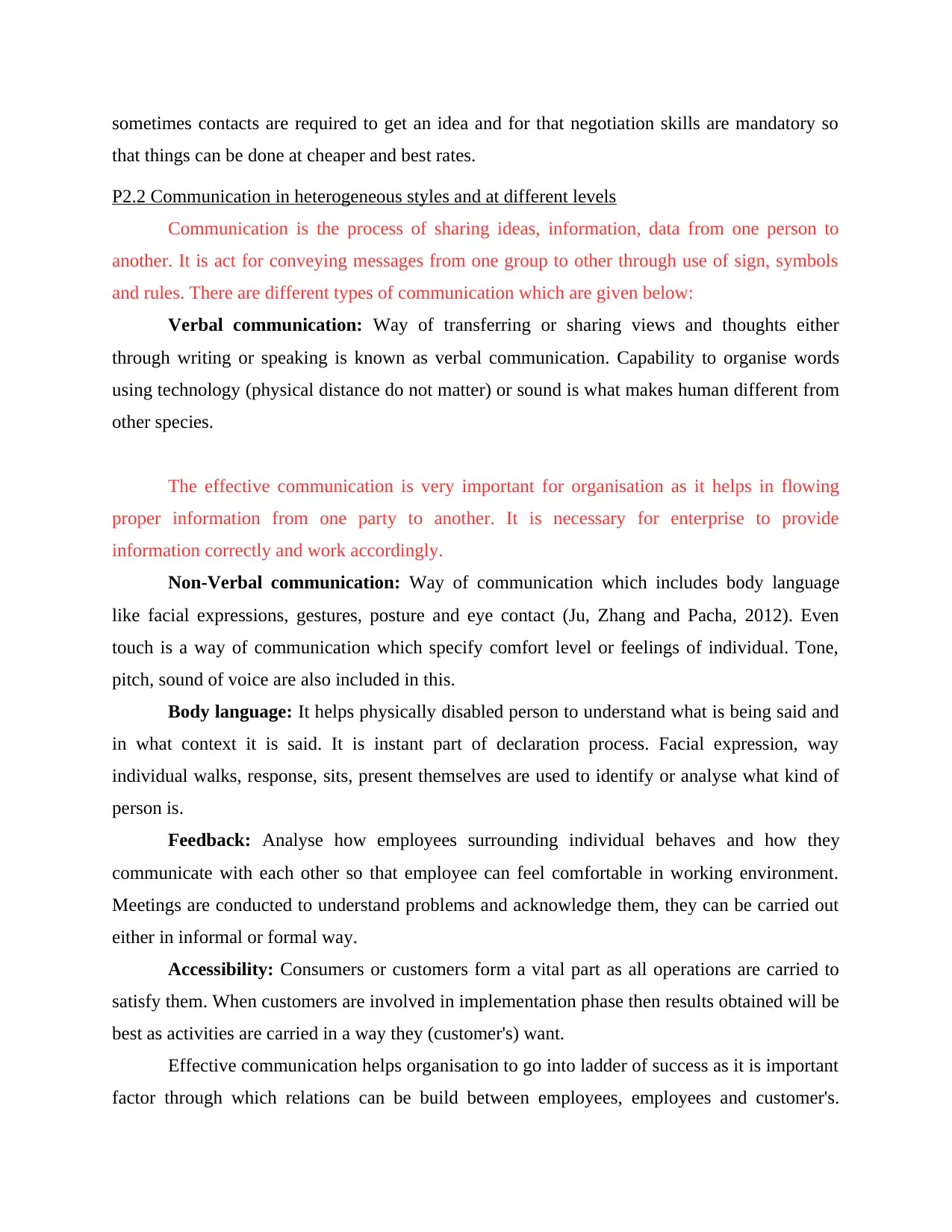
sometimes contacts are required to get an idea and for that negotiation skills are mandatory so
that things can be done at cheaper and best rates.
P2.2 Communication in heterogeneous styles and at different levels
Communication is the process of sharing ideas, information, data from one person to
another. It is act for conveying messages from one group to other through use of sign, symbols
and rules. There are different types of communication which are given below:
Verbal communication: Way of transferring or sharing views and thoughts either
through writing or speaking is known as verbal communication. Capability to organise words
using technology (physical distance do not matter) or sound is what makes human different from
other species.
The effective communication is very important for organisation as it helps in flowing
proper information from one party to another. It is necessary for enterprise to provide
information correctly and work accordingly.
Non-Verbal communication: Way of communication which includes body language
like facial expressions, gestures, posture and eye contact (Ju, Zhang and Pacha, 2012). Even
touch is a way of communication which specify comfort level or feelings of individual. Tone,
pitch, sound of voice are also included in this.
Body language: It helps physically disabled person to understand what is being said and
in what context it is said. It is instant part of declaration process. Facial expression, way
individual walks, response, sits, present themselves are used to identify or analyse what kind of
person is.
Feedback: Analyse how employees surrounding individual behaves and how they
communicate with each other so that employee can feel comfortable in working environment.
Meetings are conducted to understand problems and acknowledge them, they can be carried out
either in informal or formal way.
Accessibility: Consumers or customers form a vital part as all operations are carried to
satisfy them. When customers are involved in implementation phase then results obtained will be
best as activities are carried in a way they (customer's) want.
Effective communication helps organisation to go into ladder of success as it is important
factor through which relations can be build between employees, employees and customer's.
that things can be done at cheaper and best rates.
P2.2 Communication in heterogeneous styles and at different levels
Communication is the process of sharing ideas, information, data from one person to
another. It is act for conveying messages from one group to other through use of sign, symbols
and rules. There are different types of communication which are given below:
Verbal communication: Way of transferring or sharing views and thoughts either
through writing or speaking is known as verbal communication. Capability to organise words
using technology (physical distance do not matter) or sound is what makes human different from
other species.
The effective communication is very important for organisation as it helps in flowing
proper information from one party to another. It is necessary for enterprise to provide
information correctly and work accordingly.
Non-Verbal communication: Way of communication which includes body language
like facial expressions, gestures, posture and eye contact (Ju, Zhang and Pacha, 2012). Even
touch is a way of communication which specify comfort level or feelings of individual. Tone,
pitch, sound of voice are also included in this.
Body language: It helps physically disabled person to understand what is being said and
in what context it is said. It is instant part of declaration process. Facial expression, way
individual walks, response, sits, present themselves are used to identify or analyse what kind of
person is.
Feedback: Analyse how employees surrounding individual behaves and how they
communicate with each other so that employee can feel comfortable in working environment.
Meetings are conducted to understand problems and acknowledge them, they can be carried out
either in informal or formal way.
Accessibility: Consumers or customers form a vital part as all operations are carried to
satisfy them. When customers are involved in implementation phase then results obtained will be
best as activities are carried in a way they (customer's) want.
Effective communication helps organisation to go into ladder of success as it is important
factor through which relations can be build between employees, employees and customer's.
⊘ This is a preview!⊘
Do you want full access?
Subscribe today to unlock all pages.

Trusted by 1+ million students worldwide
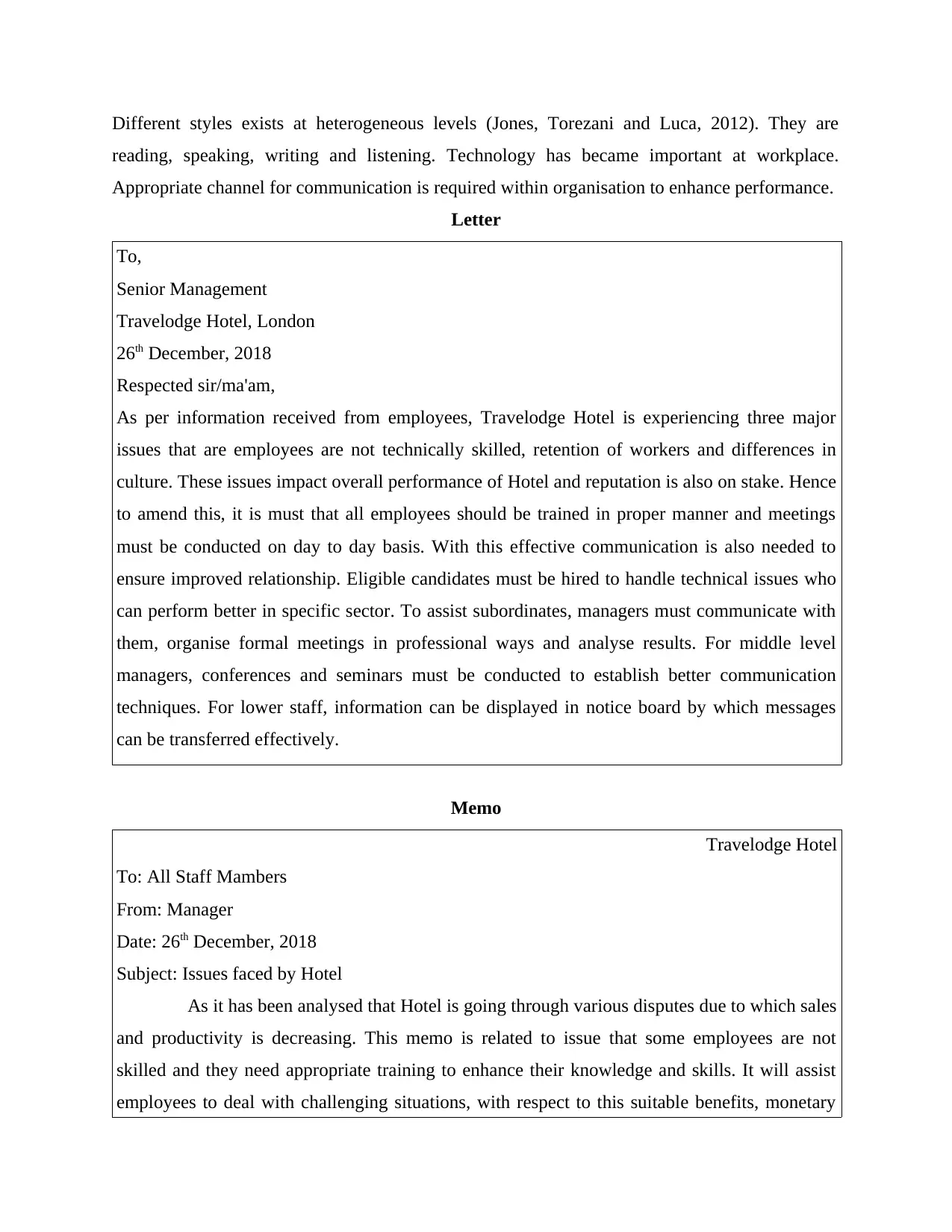
Different styles exists at heterogeneous levels (Jones, Torezani and Luca, 2012). They are
reading, speaking, writing and listening. Technology has became important at workplace.
Appropriate channel for communication is required within organisation to enhance performance.
Letter
To,
Senior Management
Travelodge Hotel, London
26th December, 2018
Respected sir/ma'am,
As per information received from employees, Travelodge Hotel is experiencing three major
issues that are employees are not technically skilled, retention of workers and differences in
culture. These issues impact overall performance of Hotel and reputation is also on stake. Hence
to amend this, it is must that all employees should be trained in proper manner and meetings
must be conducted on day to day basis. With this effective communication is also needed to
ensure improved relationship. Eligible candidates must be hired to handle technical issues who
can perform better in specific sector. To assist subordinates, managers must communicate with
them, organise formal meetings in professional ways and analyse results. For middle level
managers, conferences and seminars must be conducted to establish better communication
techniques. For lower staff, information can be displayed in notice board by which messages
can be transferred effectively.
Memo
Travelodge Hotel
To: All Staff Mambers
From: Manager
Date: 26th December, 2018
Subject: Issues faced by Hotel
As it has been analysed that Hotel is going through various disputes due to which sales
and productivity is decreasing. This memo is related to issue that some employees are not
skilled and they need appropriate training to enhance their knowledge and skills. It will assist
employees to deal with challenging situations, with respect to this suitable benefits, monetary
reading, speaking, writing and listening. Technology has became important at workplace.
Appropriate channel for communication is required within organisation to enhance performance.
Letter
To,
Senior Management
Travelodge Hotel, London
26th December, 2018
Respected sir/ma'am,
As per information received from employees, Travelodge Hotel is experiencing three major
issues that are employees are not technically skilled, retention of workers and differences in
culture. These issues impact overall performance of Hotel and reputation is also on stake. Hence
to amend this, it is must that all employees should be trained in proper manner and meetings
must be conducted on day to day basis. With this effective communication is also needed to
ensure improved relationship. Eligible candidates must be hired to handle technical issues who
can perform better in specific sector. To assist subordinates, managers must communicate with
them, organise formal meetings in professional ways and analyse results. For middle level
managers, conferences and seminars must be conducted to establish better communication
techniques. For lower staff, information can be displayed in notice board by which messages
can be transferred effectively.
Memo
Travelodge Hotel
To: All Staff Mambers
From: Manager
Date: 26th December, 2018
Subject: Issues faced by Hotel
As it has been analysed that Hotel is going through various disputes due to which sales
and productivity is decreasing. This memo is related to issue that some employees are not
skilled and they need appropriate training to enhance their knowledge and skills. It will assist
employees to deal with challenging situations, with respect to this suitable benefits, monetary
Paraphrase This Document
Need a fresh take? Get an instant paraphrase of this document with our AI Paraphraser
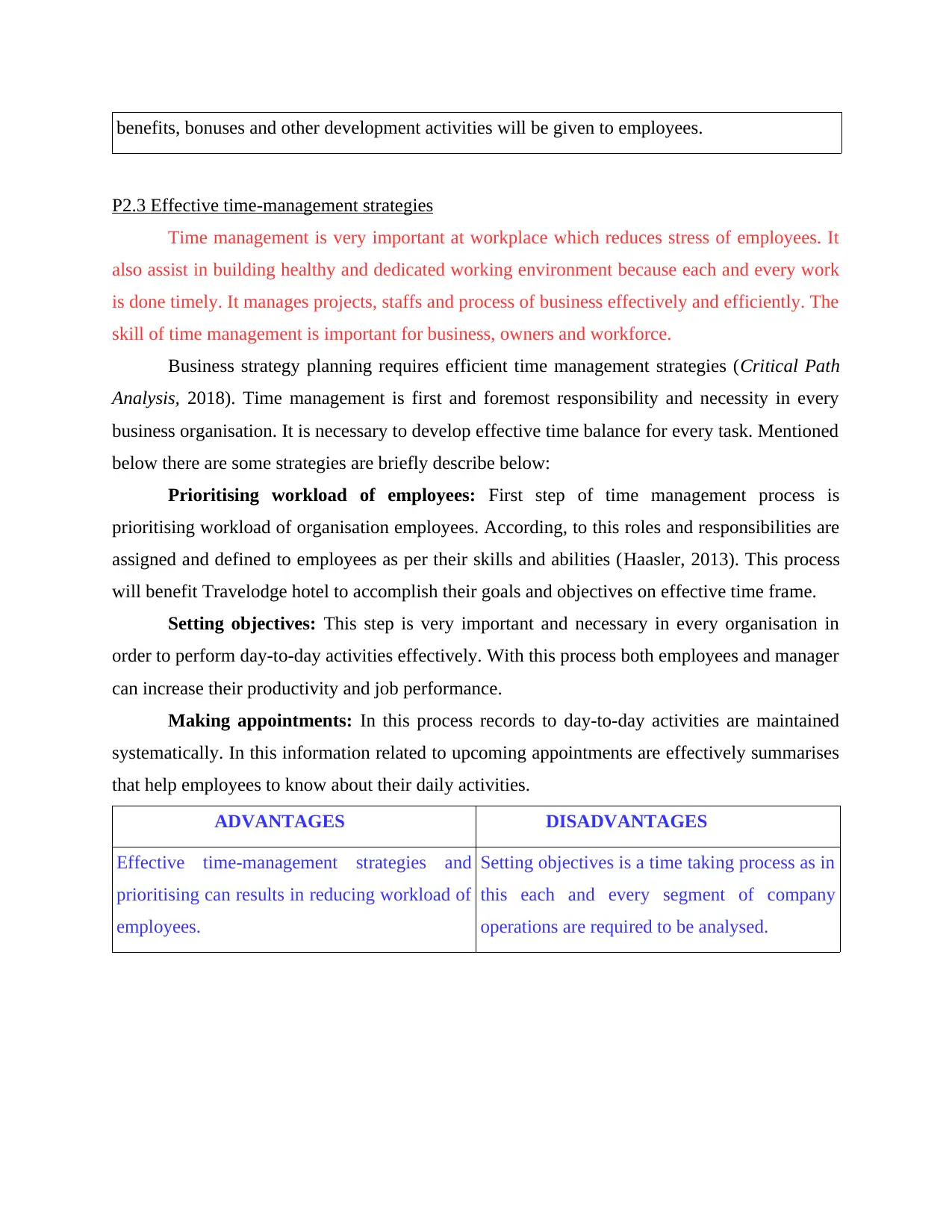
benefits, bonuses and other development activities will be given to employees.
P2.3 Effective time-management strategies
Time management is very important at workplace which reduces stress of employees. It
also assist in building healthy and dedicated working environment because each and every work
is done timely. It manages projects, staffs and process of business effectively and efficiently. The
skill of time management is important for business, owners and workforce.
Business strategy planning requires efficient time management strategies (Critical Path
Analysis, 2018). Time management is first and foremost responsibility and necessity in every
business organisation. It is necessary to develop effective time balance for every task. Mentioned
below there are some strategies are briefly describe below:
Prioritising workload of employees: First step of time management process is
prioritising workload of organisation employees. According, to this roles and responsibilities are
assigned and defined to employees as per their skills and abilities (Haasler, 2013). This process
will benefit Travelodge hotel to accomplish their goals and objectives on effective time frame.
Setting objectives: This step is very important and necessary in every organisation in
order to perform day-to-day activities effectively. With this process both employees and manager
can increase their productivity and job performance.
Making appointments: In this process records to day-to-day activities are maintained
systematically. In this information related to upcoming appointments are effectively summarises
that help employees to know about their daily activities.
ADVANTAGES DISADVANTAGES
Effective time-management strategies and
prioritising can results in reducing workload of
employees.
Setting objectives is a time taking process as in
this each and every segment of company
operations are required to be analysed.
P2.3 Effective time-management strategies
Time management is very important at workplace which reduces stress of employees. It
also assist in building healthy and dedicated working environment because each and every work
is done timely. It manages projects, staffs and process of business effectively and efficiently. The
skill of time management is important for business, owners and workforce.
Business strategy planning requires efficient time management strategies (Critical Path
Analysis, 2018). Time management is first and foremost responsibility and necessity in every
business organisation. It is necessary to develop effective time balance for every task. Mentioned
below there are some strategies are briefly describe below:
Prioritising workload of employees: First step of time management process is
prioritising workload of organisation employees. According, to this roles and responsibilities are
assigned and defined to employees as per their skills and abilities (Haasler, 2013). This process
will benefit Travelodge hotel to accomplish their goals and objectives on effective time frame.
Setting objectives: This step is very important and necessary in every organisation in
order to perform day-to-day activities effectively. With this process both employees and manager
can increase their productivity and job performance.
Making appointments: In this process records to day-to-day activities are maintained
systematically. In this information related to upcoming appointments are effectively summarises
that help employees to know about their daily activities.
ADVANTAGES DISADVANTAGES
Effective time-management strategies and
prioritising can results in reducing workload of
employees.
Setting objectives is a time taking process as in
this each and every segment of company
operations are required to be analysed.
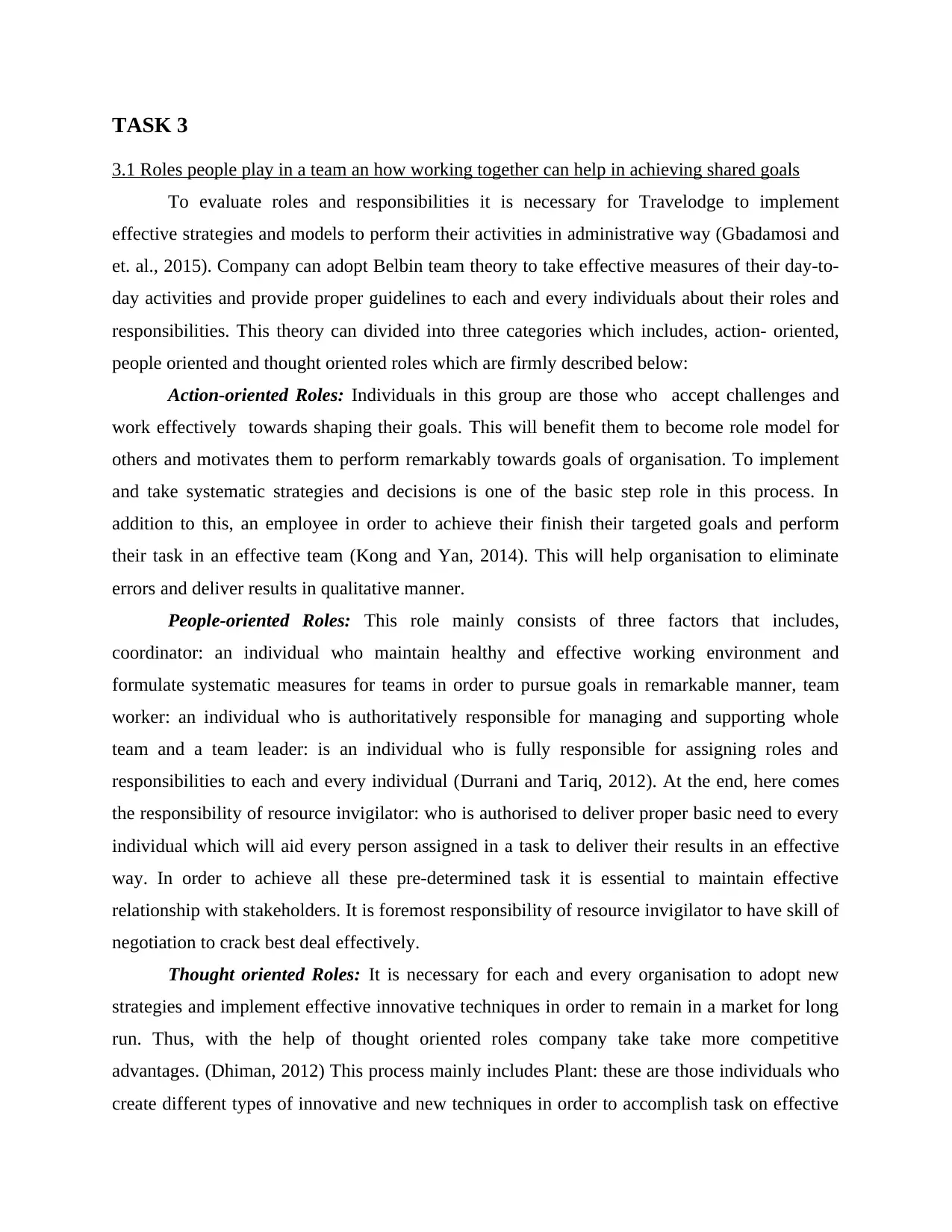
TASK 3
3.1 Roles people play in a team an how working together can help in achieving shared goals
To evaluate roles and responsibilities it is necessary for Travelodge to implement
effective strategies and models to perform their activities in administrative way (Gbadamosi and
et. al., 2015). Company can adopt Belbin team theory to take effective measures of their day-to-
day activities and provide proper guidelines to each and every individuals about their roles and
responsibilities. This theory can divided into three categories which includes, action- oriented,
people oriented and thought oriented roles which are firmly described below:
Action-oriented Roles: Individuals in this group are those who accept challenges and
work effectively towards shaping their goals. This will benefit them to become role model for
others and motivates them to perform remarkably towards goals of organisation. To implement
and take systematic strategies and decisions is one of the basic step role in this process. In
addition to this, an employee in order to achieve their finish their targeted goals and perform
their task in an effective team (Kong and Yan, 2014). This will help organisation to eliminate
errors and deliver results in qualitative manner.
People-oriented Roles: This role mainly consists of three factors that includes,
coordinator: an individual who maintain healthy and effective working environment and
formulate systematic measures for teams in order to pursue goals in remarkable manner, team
worker: an individual who is authoritatively responsible for managing and supporting whole
team and a team leader: is an individual who is fully responsible for assigning roles and
responsibilities to each and every individual (Durrani and Tariq, 2012). At the end, here comes
the responsibility of resource invigilator: who is authorised to deliver proper basic need to every
individual which will aid every person assigned in a task to deliver their results in an effective
way. In order to achieve all these pre-determined task it is essential to maintain effective
relationship with stakeholders. It is foremost responsibility of resource invigilator to have skill of
negotiation to crack best deal effectively.
Thought oriented Roles: It is necessary for each and every organisation to adopt new
strategies and implement effective innovative techniques in order to remain in a market for long
run. Thus, with the help of thought oriented roles company take take more competitive
advantages. (Dhiman, 2012) This process mainly includes Plant: these are those individuals who
create different types of innovative and new techniques in order to accomplish task on effective
3.1 Roles people play in a team an how working together can help in achieving shared goals
To evaluate roles and responsibilities it is necessary for Travelodge to implement
effective strategies and models to perform their activities in administrative way (Gbadamosi and
et. al., 2015). Company can adopt Belbin team theory to take effective measures of their day-to-
day activities and provide proper guidelines to each and every individuals about their roles and
responsibilities. This theory can divided into three categories which includes, action- oriented,
people oriented and thought oriented roles which are firmly described below:
Action-oriented Roles: Individuals in this group are those who accept challenges and
work effectively towards shaping their goals. This will benefit them to become role model for
others and motivates them to perform remarkably towards goals of organisation. To implement
and take systematic strategies and decisions is one of the basic step role in this process. In
addition to this, an employee in order to achieve their finish their targeted goals and perform
their task in an effective team (Kong and Yan, 2014). This will help organisation to eliminate
errors and deliver results in qualitative manner.
People-oriented Roles: This role mainly consists of three factors that includes,
coordinator: an individual who maintain healthy and effective working environment and
formulate systematic measures for teams in order to pursue goals in remarkable manner, team
worker: an individual who is authoritatively responsible for managing and supporting whole
team and a team leader: is an individual who is fully responsible for assigning roles and
responsibilities to each and every individual (Durrani and Tariq, 2012). At the end, here comes
the responsibility of resource invigilator: who is authorised to deliver proper basic need to every
individual which will aid every person assigned in a task to deliver their results in an effective
way. In order to achieve all these pre-determined task it is essential to maintain effective
relationship with stakeholders. It is foremost responsibility of resource invigilator to have skill of
negotiation to crack best deal effectively.
Thought oriented Roles: It is necessary for each and every organisation to adopt new
strategies and implement effective innovative techniques in order to remain in a market for long
run. Thus, with the help of thought oriented roles company take take more competitive
advantages. (Dhiman, 2012) This process mainly includes Plant: these are those individuals who
create different types of innovative and new techniques in order to accomplish task on effective
⊘ This is a preview!⊘
Do you want full access?
Subscribe today to unlock all pages.

Trusted by 1+ million students worldwide
1 out of 19
Related Documents
Your All-in-One AI-Powered Toolkit for Academic Success.
+13062052269
info@desklib.com
Available 24*7 on WhatsApp / Email
![[object Object]](/_next/static/media/star-bottom.7253800d.svg)
Unlock your academic potential
Copyright © 2020–2025 A2Z Services. All Rights Reserved. Developed and managed by ZUCOL.




